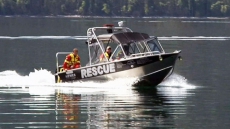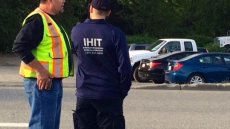Earlier this month, the RCMP threw a retirement party in St. John's, N.L., for a Labrador retriever named Luke.
As the saying goes, you can't teach an old dog new tricks, and as cannabis legalization approaches, that puts Luke and other dogs like him out of work.
Luke, who sniffed more than five million of dollars' worth of drugs during his time on the force, is one of 14 canines across the country who will be out of a job before October 17.
Traffic and interdiction dogs like Luke are trained to detect cannabis, but once the substance is legal, they can no longer be used to establish grounds for search in a traffic stop.
All 14 dogs need to be replaced, and it will cost about $5,000 to train each new pup with the updated drug palette that excludes cannabis.
Luke is the only dog retiring in Newfoundland and Labrador, but there are others in British Columbia, Alberta, Nova Scotia, New Brunswick, and Manitoba who will be hanging up their hats by October.
Traffic and interdiction dogs represent about 12 per cent of the total narcotics canine force. Staff Sgt. Gary Creed, senior trainer at the RCMP's police dog service in Innisfail, Alta., says he considers this the largest group of dogs the force has ever had to replace at one time.
And with a staff of just seven trainers, Creed is not sure that the replacements will be ready before the legalization date.
"Yes, it's going to be a strain on our budget, but it's manageable," Creed said.
"The federal government changes the laws on us, right, and we have to deal with it. And not just us, all police forces."
The force's general duty dogs can still be used in situations where cannabis is still illegal, or when grounds for search have already been established, minimizing the number of replacements.
But Creed said it's been a work-in-progress figuring out how to manage the quick, sizable turnover.
In the scenario that the dogs aren't trained by October 17, Creed said he isn't sure how the officers will proceed in the field without their four-legged partners.
"The guys will just have to manage that out on the road," said Creed.
The RCMP has updated the narcotics detection profile for its dogs before. A few years ago, the animals were taught to detect fentanyl — but adding one substance to the dogs' training is significantly easier and cheaper than putting a whole group through a new course.
Creed said he hopes to have the replacements ready for duty by the end of the year.
It takes between 20 and 50 days for a dog to complete the narcotics training at the Innisfail centre, where the force breeds and trains its canines.
The dogs are taught to detect illegal substances and run through training simulations before they're sent off across the country with their new handlers.
For Luke, it's been a long journey from the street to today's cushy retirement.
Luke was recruited by Sgt. Don Bill, who found him at an animal shelter in St. John's. Luke completed his training course with flying colours — and the Labrador retriever stood out among his peers at the training centre, where most are German shepherds bred specifically for duty.
His handler is retiring from the force as well, giving 11-year-old Luke an early retirement in July.
Caroline Nadeau, an RCMP spokeswoman, said the bond between the officer and dog is so strong that in most cases, the handlers keep their dogs as pets when they retire from active duty.
But Luke's handler is moving to a colder climate, so he's given Luke to a new home in St. John's where he can enjoy his retirement.
Nadeau said Luke and the others will spend their days doing what dogs do best.
"They finally get to play all day."



